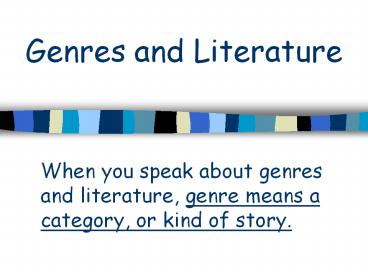Genres and Literature - PowerPoint PPT Presentation
Title: Genres and Literature
1
Genres and Literature
- When you speak about genres and literature, genre
means a category, or kind of story.
2
All categories of books or stories can be called
either fiction or non-fiction.
- Fiction
- a made up story
- can tell about things that could happen
- is read for fun
- characters may be like real people or imaginary
- Non-Fiction
- has facts that can be checked and proven
- the author is an expert on this information
- it IS TRUE!
3
Action/Adventure/Thriller
- The characters (and the reader) can always expect
the worst - the main characters can, and usually
do, have everything thrown at them. - Action, action and more action are hallmarks of a
good adventure/suspense book. - And finally, there must be a villain, for without
a foewithout an adversary, there can be no
adventureno suspense.
4
Crime/Detective/Mystery
- Most - though not all - crime and detective
novels share a common structure. First there is
the crime, usually a murder then there is the
investigation and finally the outcome or
judgment, often in the shape of the criminal's
arrest or death. - Mysteries are stories that have a real setting
and a problem to be solved that includes clues,
distractions, and an answer to the problem.
5
Fantasy
- Fantasy is fiction that has elements that are not
real. Sometimes this includes talking animals or
characters with magical powers. Theres usually
a conflict between good and evil.
6
Horror
- Horror fiction is, broadly, fiction intended to
scare, unsettle or horrify the reader. - May be supernatural or non-supernatural
- Although mostly supernatural, any fiction with a
morbid, gruesome, surreal, suspenseful or
frightening theme may be termed "horror.
7
Romance
- A romance is a work in which the plot centers
around a love relationship. - It has two strict criteria
- The first is that the story must focus on the
relationship and romantic love between two
people. - Secondly, the end of the story must be positive,
leaving the reader believing that the
protagonists' love and relationship will endure
for the rest of their lives.
8
Science-Fiction (Sci-Fi)
- Science Fiction is made up of stories that blend
fact and fiction with futuristic technology. This
is a form of writing that is concerned with a
world removed in some fundamental way from our
own, whether in time, attitude or knowledge.
9
Western
- Westerns are a novel or collection of stories set
in 19th century frontier America with - a strong, self-reliant central character
- simple plots
- full of action
- often involves cowboys, cavalrymen, lawmen and
outlaws of the Old West.
10
Childrens/Young Adult
- Picture books - the illustrations play a
significant role in telling the story. - Early readersAlso called "easy-to-read", these
books are designed for "emergent readers" -
children who are just learning to read on their
own. Most of these books are intended for primary
grades (age 6-8). - Chapter booksFor ages 7-10, Chapter books are
transitional books that help children move from
early readers to full novels. - Middle-Grade NovelsThis is the golden age of
reading for many children, ages 8-12. A novel,
unlike the picture book, relies entirely on text
to tell the story. - Young AdultYoung adult novels, also sometimes
called teen novels, are generally read by
children anywhere from age 12 upwards. Most are
contemporary stories, and often involve
contemporary problems, including drugs, sex, and
peer pressure.
11
Experimental
- Experimental fiction breaks one or more of the
conventions that the reader expects to find - All the main characters may be depicted as
hateful, disgusting human beings. - Instead of delivering a discernible story, the
writer may ramble on about this and that, piling
digression upon digression. - As the reader attempts to settle into the
fictional dream, the writer may intrude by
addressing the reader directly. - The writer may play with language, wrenching
meaning and syntax in unexpected ways
12
Literary v. Popular Fiction
- Literary fiction focuses more on style, depth and
character development. This type tends to be
considered to have more literary merit - Popular fiction focuses more on plot and
narrative - Gone With the Wind vs. Harry Potter
13
Works Cited
- Bennett, Steve. Childrens Literature and
Fiction Genre definition. http//www.findmeanauth
or.com/?childrens_fiction_genre.htm.
findmeanauthor.com, 2009. Web. 15 Aug. 2011. - - - -. Crime Fiction Genre Definition.
http//www.findmeanauthor.com/?crime_fiction.htm.
findmeanauthor.com, 2009. Web. 15 Aug. 2011. - - - -. Romantic Fiction Genre definition.
http//www.findmeanauthor.com/?romantic_fiction_ge
nre.htm. findmeanauthor.com, 2009. Web. 15 Aug.
2011. - - - -. Thriller Fiction Genre definition.
http//www.findmeanauthor.com/?thriller_fiction_ge
nre.htm. findmeanauthor.com, 2009. Web. 15 Aug.
2011. - - - -. Western Fiction Genre definition.
http//www.findmeanauthor.com/?western_fiction_gen
re.htm. findmeanauthor.com, 2009. Web. 15 Aug.
2011. - French, Bonnie, Tina Laramie, and Michele Romeo.
GENRES. N.d. PowerPoint file. - Introduction to Genres. N.d. PowerPoint file.































